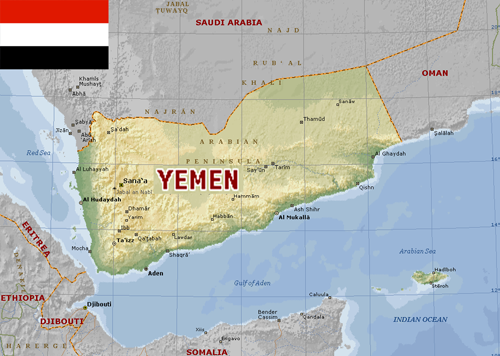By Catherine Shakdam
If Yemenis thought themselves safe from the reach of Al Qaeda in the Yemeni capital, Sana’a, confident that the terror group would never dare directly target civilians –thus far Al Qaeda militants have limited their attacks to state officials and military figureheads – Thursday bomb blast shattered that belief.
As supporters of the Houthis – Zaidi faction organized under the leadership of Abdel-Malek Al Houthi, Sheikh Hussein Baddreddin Al Houthi’s heir – gathered near Tahrir Square to express their support to Al Houthi’s campaign against political manipulation and abuses of power, they were stroke by terror militants, slayed by those who claim to be Islam’s righteous.
A day after Abdel-Malek Al Houthi slammed President Abdo-Rabbo Mansour Hadi for the nomination as Prime Minister of Dr. Ahmed Awad bin Mubarak , a man whose political career so far has been often marred by scandals and allegation of corruption, Al Qaeda moved against the group supporters, targeting a popular rally to send its message.
While state officials, including President Hadi were keen to denounce such a treacherous attack, branding the targeting of innocent and unarmed citizens an atrocity and an act of incommensurable barbarism, observers, among whom independent political analyst and researcher Fadli Al Seyaghi have warned that the arrival of Al Qaeda within the walls of the capital very much appeared engineered.
Speaking to ABNA, Al Seyaghi explained that the timing of the attack screams political opportunism. “Al Qaeda’s latest attack against is clearly political and sectarian in nature. The terror group seeks to serve certain individuals’ political agenda … otherwise why target the very group [the Houthis] the people have come to support? Someone in Sana’a does not want the Houthis to defend the people’s interests based on the fact they belong to Shia Islam.
He added, “Someone in Sana’a wants to divide Yemen along sectarian lines, pitting one community against another, exploiting fear and bigotry to engineer a power takeover.”
Fallouts of the attack
According to the health ministry an estimated 47 Yemenis, including women and children were killed in the bomb attack and an additional 75 were injured, making it the single most deadly attack against civilians by the hand of Al Qaeda.
Slayed as they stood for their political beliefs and exercise their civil rights, Yemen is mourning its dead, its people profoundly shocked by the idea that powers would stoop so low as to strike innocent civilians in the name of power and control.
Residents in Sana’a have said to be dubious as to state officials’ innocence. Fatma Hassan, a refugee from Amran said she believes the attack is only the beginning. “We all know that our leaders are corrupt … they have been bought by America and Saudi Arabia. Everything they do and everything they say is a lie. Until the Houthis came to liberate us we cowered in fear … we were slaves in our land. They want to turn the people against the Houthis, they want to kill those who have given us a chance at a real democracy.”
She added defiant, “Al Qaeda is a fabrication, the Americans and the Saudis have created them to enslave us …they want to destroy Yemen and plunder its riches. We all know this, the only one doing something about it is Abdel-Malek Al Houthi. As far as I’m concern he is our leader, the only one worthy of Yemen.”
A former military officer who asked to remain anonymous warned that Thursday attack signals that al Qaeda has moved its battleground against civilians. “More attacks will undoubtedly follow … we have seen the same thing happens in Iraq and Syria. Yemen has become takfiris’s new frontline.”
The Sectarian divide
Ever since the Houthis have risen against Islamists in the highlands, determined to reclaim the land of their forefathers and restore people’s freedom and civil rights, state officials and foreign media have been bent on labelling the group under its sectarian denomination, underscoring the Houthis’ affiliation to Shia Islam rather than their political beliefs.
Even though the Houthis have never demonstrated any prejudice against their fellow Yemenis based on their religious preferences, their detractors have never missed an opportunity to remind the world that Yemen Zaidis were Shia, as if Shia Islam was a tar to be ashamed of.
But if the world has been gullible, the people of Yemen have proven to be wiser than given credit for by their politicians. Few have fallen into the sectarian trap set before them by Islamists and vindictive politicians. But fears remain that Yemen will be sucked into a whirlwind of violence and bloodshed, the next domino to fall to radical Islamists.
As noted by historian and religious scholar Mohammed Al Mossawa, Zaidis are the oldest branch of Shia Islam … the people of Imam Ali (AS). Over 40% of Yemen is Zaidi. Northern Yemen has been built on the Zaidi school of thoughts, it is part of Yemen’s history … it is ridiculous to make it sound as if it has all of the sudden become something to be fearful of or even in opposition of.”
He added, “Those who seek to ignite violence by exploiting religious prejudices are the real enemies of Islam and the Yemeni people. As a religious scholar I would actually argue that Shia Islam has been misconstrued … the real religious deviation was when Muslims chose to stand against their legitimate caliph, Imam Ali (AS) and stand with those who called for his murder. There lies the real betrayal.”
/149

